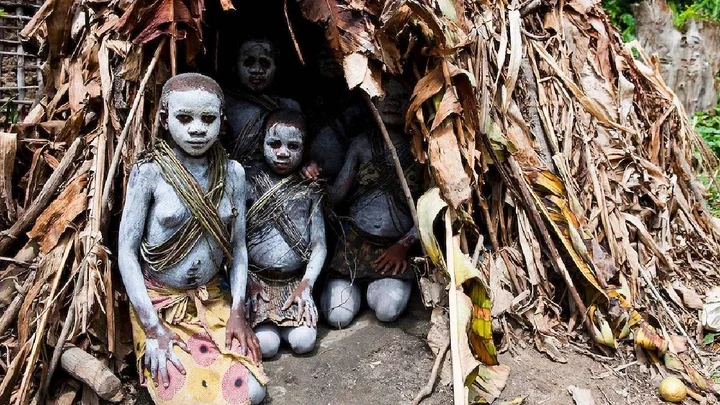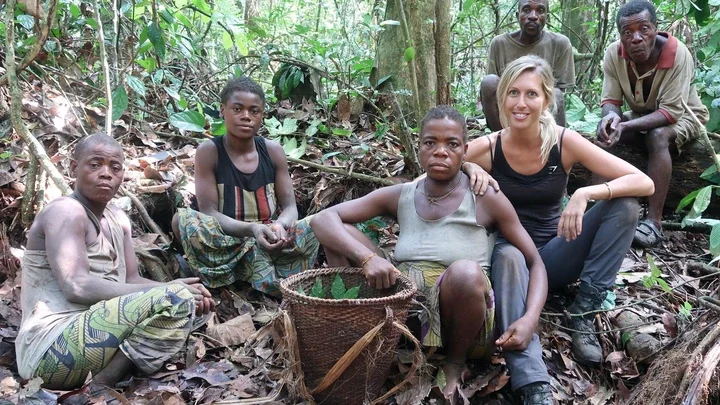What is the shortest tribe in Africa? For starters, Africa is a rich and diverse place with numerous tribes scattered across the length of the continent.
As a result, it is often referred to as a tribal continent.
There are about 3,000 tribes from diverse regions in Africa with varying numbers of people. These tribes also vary in terms of culture, appearance, language, lifestyles and traditions.
Most of the African tribes were precolonial states with their own independent institutions. Wondering what is the shortest tribe in Africa and what they look like? Well, worry no more because that’s what we will be looking at here.
What Is the Shortest Tribe in Africa?
The Bambuti tribe, also known as Mbuti, take the crown of Africa’s shortest tribe. The Bambuti is a collective name for four populations of Ituri Pygmies who live in the Ituri Forest in Eastern Congo (Kinshasa). They average under 4 feet 6 inches (137 cm) in height.

Even though, archaeological evidence is lacking, early Egyptian records show that the Bambuti are probably the earliest inhabitants of Central Africa.
They have been in the same area for about 4,500 years now.
The Bambuti are assumed to be descended from the original Middle Stone Age expansion of anatomically modern humans.
However, they were greatly affected by the migration from West Africa limiting them to a comparative small area.
They live in small bands that vary in size and are nomadic hunters.
They depend on the tropical rainforest for their basic needs such as fresh water, food and clothing, which they also supplement through trade.
Since the forest provides the Bambuti with all that they need for survival, they call themselves ‘bamiki bandura’, which translates to the children of the forest.
They view the forest as parental deity and something that deserves love and praise.
The Bambuti, who are the shortest tribe in Africa, live in simple huts that are covered with phrynium leaves.
Surprisingly, they don’t have any formal council of elders or chiefs.
They solve their problems through general discussions.
Over the years, the Bambuti have also been affected by enslavement and cannibalism at the hands of their Bantu Neighbours.
During the Congo war and Rwanda genocide, over 20,000 pygmies died.
The Mbuti and other pygmies have been marginalized by governments and churches among other groups in Congo for years.
They are sometimes not considered citizens and denied identity cards.
They do not receive proper education or health care and have also been evicted from their land.
Due to these challenges and others, the Bambuti have remained unreached for a long time.

How Tall Are Pygmies?
Pygmies are less than around five feet tall.
They are merely 35% shorter than ordinary human beings.
This short stature is genetic, research has shown, not merely the result of malnutrition.
Why Are Pygmies Short?
Over the years, researchers have been trying to find out why pygmies are the shortest tribe in Africa.
There have been various theories proposed to explain the short stature of pygmies.
Traditional explanations attribute pygmies’ stature to minimizing caloric requirements and walking in dense forests.
However, there are studies which suggest that the pygmies’ height could be related to adaption to low ultraviolet light levels in rainforests.
This means that low vitamin D is made in their skin hence limiting calcium uptake from the diet for the growth of bones.
There is another explanation which points towards unusually low levels of expression of the genes encoding the growth hormone receptor.
Apart from their short height, the pygmies also differ in blood type from their Bantu and Sudanic-speaking Neighbours.
What Is the Smallest Tribe Ever?
Determining the smallest tribe ever can be a bit challenging; however, sources point towards Toto as the smallest tribe ever.
Toto is a primitive Indo-Bhutanese tribe that resides in a small enclave known as Totopara in West Bengal, India.
Since 1950, the population of the Totos has been declining.
As of now, their population is about 1377 and their life span is very short (35-40).
Most of the Totos are beta Thalassemia carriers, a genetic disease caused by the mutation of the beta globin gene.




